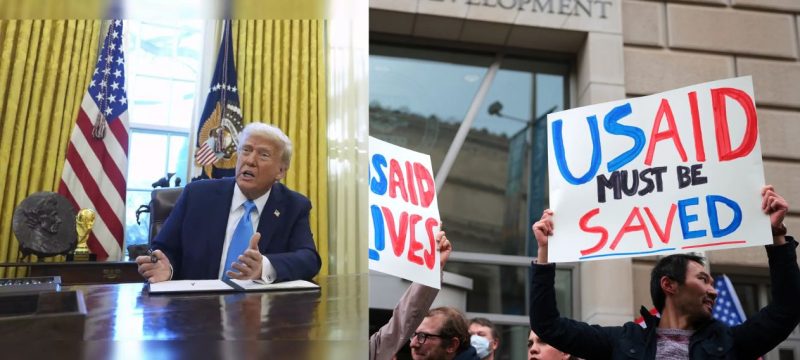A federal judge has temporarily halted former President Donald Trump’s plan to place thousands of U.S. Agency for International Development (USAID) employees on leave. U.S. District Judge Carl Nichols, a Trump appointee, ruled in favor of two federal employee organizations, blocking the move that aimed to place 2,200 USAID employees on paid leave by midnight Friday.
The ruling does not entirely reverse the administration’s restructuring plans but prevents immediate workforce reductions. The lawsuit, filed by the American Foreign Service Association and the American Federation of Government Employees, argued that dismantling the six-decade-old agency requires congressional approval, a concern echoed by Democratic lawmakers.
Read more: Special Counsel Report Accuses Donald Trump of “Criminal Effort” to Retain Power
Targeting USAID
The Trump administration, in collaboration with billionaire Elon Musk, who leads the newly formed Department of Government Efficiency, has aggressively pushed for USAID’s dissolution. As part of these efforts, nearly all aid programs have been suspended, employees have been furloughed, and access to official systems has been restricted. Reports suggest that USAID’s computer servers were removed from its offices.
Before the ruling, Trump took to social media, writing, “CLOSE IT DOWN.” Following this, USAID staff began removing signage from its Washington headquarters, covering nameplates with duct tape and lowering agency flags. Outside the entrance, a bouquet of flowers was left in what appeared to be a symbolic farewell to the organization.
Impact on Global Aid
The administration had also ordered most overseas USAID employees to return to the U.S. within 30 days, with government-covered travel expenses. However, an agency notice stated that those staying beyond the deadline would have to finance their own expenses unless granted a hardship waiver.
Officials warned that the suspension of aid programs has disrupted crucial humanitarian assistance. Among the affected projects is a $450 million food aid program, meant to feed 36 million people, and a water supply initiative for 1.6 million displaced individuals in Sudan’s Darfur region.
Despite Secretary of State Marco Rubio’s assurances that key programs were being granted waivers, USAID insiders disputed the claim, stating that no such waivers had been issued. While visiting the Dominican Republic, Rubio defended the administration’s stance, asserting that foreign aid would continue but would be “aligned with national interests.”
Legal Battle Ahead
The legal fight over USAID’s future is the latest in a string of court rulings against the Trump administration. Other blocked policies include financial incentives for federal workers to resign and the controversial attempt to end birthright citizenship for children of undocumented immigrants.
Meanwhile, concerns grow within the State Department, where officials fear substantial job cuts as the government seeks to consolidate foreign aid programs under its control. A separate court hearing is scheduled for Monday to assess the legality of financial incentives offered to federal employees for voluntary resignations.









